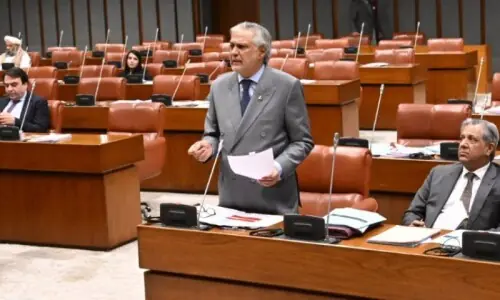• Says Pakistan among top 10 countries reporting Covid-19
• Warns govt of high positivity rate with weak surveillance system
LAHORE: The World Health Organisation (WHO) has said Pakistan has been ranked among the top 10 countries in the world reporting the highest number of new cases of Covid-19 and advised the government to enhance daily testing capacity to 50,000 to assess the actual prevalence of coronavirus across the country.
While expressing concern over the hasty lifting of restrictions, the WHO in a letter to the four provinces stated Pakistan did not meet any of the prerequisites for opening of the lockdown.
It also alerted Pakistan to its high positivity rate, underlining seriousness of the Covid-19 situation and poor efforts of the government in this regard.
As a strategy to help contain the massive transmission of coronavirus, the WHO recommended to the provinces to impose two-week lockdown. “WHO strongly recommends the two weeks off and two weeks on strategy as it offers the smallest curve,” the letter said.
Given due consideration to the test positivity rate, the WHO advised the government to raise the testing capacity beyond 50,000 tests per day. Besides, strengthening of public health measures such as quarantine, isolation, physical distancing and patient contact tracing were also recommended.
Alerting Pakistan to its high positivity with weak surveillance system, the WHO said: “The positivity rate is high at 24% (above the required level of 5%), the surveillance system (identify, test, isolate, care for the ill including identification and follow up of contacts and quarantining) is weak.”
According to it, there is a limited capacity to provide critical care (only 751 ventilators are allocated for Covid-19) and the population is not ready to adapt to change in behaviour (hand washing, respiratory etiquettes and social distancing). To this effect, Pakistan needs to take strategic decisions to either tighten or loosen public health measures, while ensuring economic prosperity, human rights and food security.
“These decisions will require the need to balance response directly to Covid-19, which includes intermittent lockdowns of target areas (districts, towns, section of the town or village) as a first option and should be dealt on priority basis while simultaneously engaging in strategic planning and coordinated action to maintain essential health services delivery, mitigating the risk of system collapse,” the letter added.
For any government that wanted to start lifting restrictions, certain conditions must be met such as virus transmission remained under control, according to the WHO. Similarly, it said, the country’s health system should be able to “detect, test, isolate and treat every case and trace every contact”. Hotspot risks are minimised in vulnerable places such as nursing homes. School, workplaces and other essential places have adopted preventive measures. The risk of importing new cases “can be managed”. Communities are fully educated, engaged and empowered to live under a new normal.
“As of today, Pakistan does not meet any of the pre-requisite conditions for opening the lockdown,” the WHO observed, while warning the government the virus had spread to every nook and corner of Pakistan.
“The pandemic has reached to almost all the districts of Pakistan while major cities contributed the highest number of cases nationally including Karachi 33.72pc, Lahore 18.5pc, Peshawar 5.31pc, Quetta 5.25pc, and Rawalpindi 3.35pc,” the letter stated.
The WHO criticised the government decision to relax the restrictions that it said resulted into increase in the number of Covid-19 cases in Pakistan. “After partial relaxation of measures on 1st May 2020, then followed by complete relaxation on 22nd May, the rate of spread of Covid-19 increased in Pakistan,” it observed.
During the lockdown, on an average 1,000 cases a day were surfacing in Pakistan that rose to 2,000 per day when the lockdown was partially relaxed, while this number had jumped to 4,000 per day, the WHO said.
Terming the WHO concerns and recommendations valid, Pakistan Peoples Party chairman Bilawal Bhutto-Zardari said that the Sindh government would deliberate upon them and take up the matter at the national level. “WHO letter to Sindh government raises valid concerns & suggestions. Will be discussed by Sindh govt before being taken up at national level. We’ve long called for national policy to be linked to facts & our own capacity. Unfortunately so far this hasn’t been national approach,” the PPP chairman tweeted on Tuesday evening.
Published in Dawn, June 10th, 2020






























